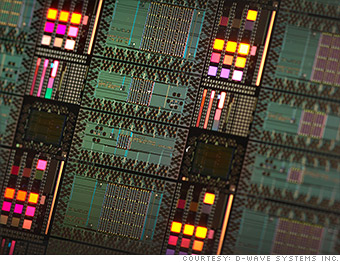

Consumer technology has lacked a wow moment recently. But flexible screens and four other promising advances could eventually lead to cool new devices.

Today's computing is painfully slow. That's because computers rely on long strings of 0's and 1's, each of which act as a yes or no. It's a never-ending game of Twenty Questions.
Computing of the future could very well rely on probabilities rather than clear yes or no answers. By employing quantum mechanics -- that bizarre subatomic lair where particles can assume multiple states at the same time -- computers could base answers on the most-likely possible states of those particles. In theory, that means answers could be delivered exponentially faster than today's fastest computers could handle.
It's a promising solution, but one that's been discussed for decades. Many companies are working on quantum computing technology, including Hewlett-Packard (HPQ), IBM (IBM), Microsoft (MSFT), and defense contractor Lockheed Martin (LMT). Meanwhile, BlackBerry (BBRY) co-founders Mike Lazaridis and Doug Fregin just created a $100 million venture capital fund to "incubate and commercialize quantum science tech."
But nobody has proven the technology can actually outpace traditional computers yet.